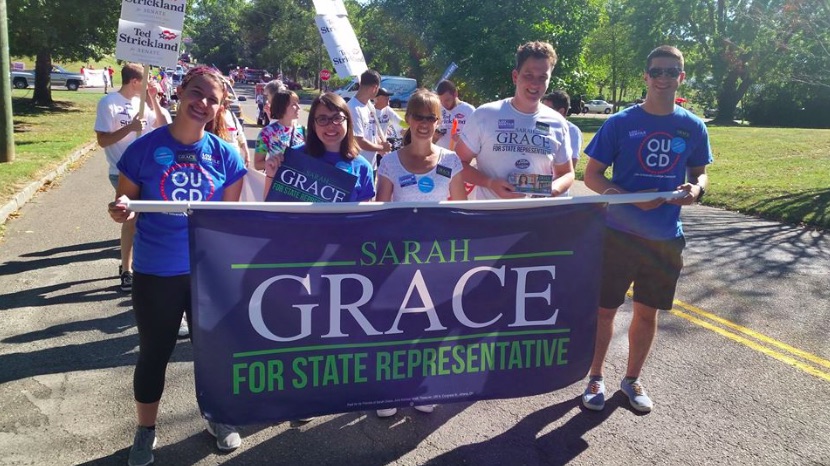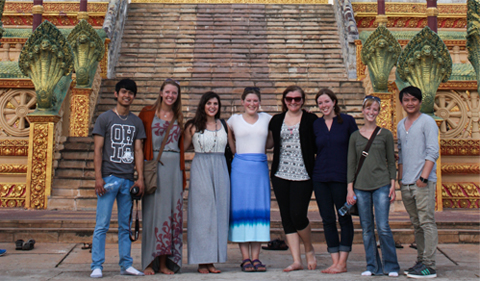
Jake McClelland (second from right) completed an internship with Sarah Grace’s campaign.
by Kristin M. Distel
“It’s nice to be well-informed and knowledgeable, but students should explore other options through internships and nonprofits. I’m so glad I did,” says junior Jake McClelland, who worked as a policy intern for Sarah Grace’s state representative campaign during the 2016 election cycle.
McClelland notes that the work he put into the campaign has paid off in dividends.
“I learned the basics of campaigning at the ground level, and I gained a much deeper insight into how campaigns operate and how much work each person was expected to do. I became familiar with the databases and software that the Democratic Party uses, how they research demographics, and how they compile and use phone bank lists.”
Learning about Regional Issues
Since McClelland’s internship was based here in Athens, he also gained deeper familiarity with the region and the people who live here.
“I developed an appreciation of what Appalachia is and what it means to call Athens ‘home,’” he notes. “I’m from Cleveland, so it was really exciting to learn about the area where I now live.”
McClelland worked on Grace’s campaign from August 1 until November 8, the day of the election. He notes that he knocked on 2,000 doors and called 5,000 people to inform them about Grace’s stances and encourage them to vote for her.
An Emphasis on Education and Environmental Policies
Since his freshman year at OHIO, when he joined Students for Education Reform, McClelland has risen through the ranks in nonprofits. “I am one of three organizers for the state of Ohio,” McClelland notes, “one of about thirty-five across the entire organization.”
He credits this leadership opportunity with helping him hone his interest in educational policy and reform.
McClelland notes that other internship opportunities existed with Rob Portman, John Kasich, and Amnesty International, but that Portman and Kasich’s political views differ too drastically from his own. Once he conducted some research on Sarah Grace, however, and learned about her emphasis on education, he determined that her campaign was best suited to his own interests and goals.
Working as a member of Grace’s team allowed McClelland to familiarize himself further with the education reform issues facing Ohio and Appalachia. His internship required him to conduct extensive research, the results of which he compiled and shared with Grace.
“I worked on one-page policy sheets that explained stances we should take on these educational issues. Grace and I discussed concepts that people were likely to present her with during debates. She was already deeply knowledgeable about these issues, of course. I worked closely with her in general, but especially on educational issues,” McClelland says.
He notes that he and Grace also discussed the state poverty tax, common core standards, and educational equity as a whole.
McClelland’s research and campaign work was not limited to educational policies, though.
“I also helped prepare Grace for discussions on fracking. For example, I researched the amount of waste water that will be put into Athens County’s injection wells. The work involved a great deal of fact-checking,” McClelland explains.
Using Classroom Skills on the Job
McClelland found that his dual major in history and political science was invaluable in preparing him for his internship responsibilities, especially in terms of his research skills.
“The work we do in the history department is very research-intensive. We have to make sure that all statements are backed up with facts. The intellectual atmosphere made available to me by OHIO and the Departments of History and Political Science has been very beneficial. Much of what I have learned in the past three years prepared me to work with Grace.”
McClelland specifically notes that “United States, 1945-present,” a history course he took with Dr. Paul Milazzo, provided a strong foundation for his internship experience. “That course looked more critically at how our nation handles policy and treats people. It was very useful.”
Dr. Jay Ryu, professor of political science and internship coordinator, helped McClelland secure his position with Grace. “I received an internship credit, and we arranged it like an independent study,” McClelland notes.
Invaluable Experience Gained
The skills McClelland acquired and honed during his internship are extensive.
“Now I can actually lead a campaign,” he explains. “I am very comfortable having direct contact with a candidate. I learned how we can make campaign events work, how to write press releases, and how to write op-eds,” McClelland states.
He remarks that his internship also emphasized the importance of diplomacy and effective communication.
“It’s all about the power of talking to people and having a message that anyone can believe in. Politicians and their staff need to see people as human beings, and not as ‘opponents’ or ‘people on the other side of the aisle.’ We shouldn’t make others feel polarized. They have interests, and they care, even if we disagree.”
“Try to save the system,” McClelland says to students who are interested in becoming involved with a political campaign. “You get as much out of volunteering as you put into it.”


















Comments